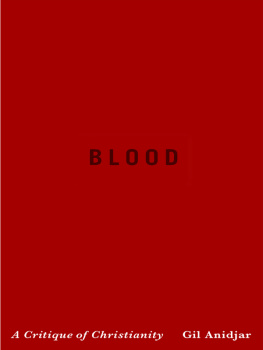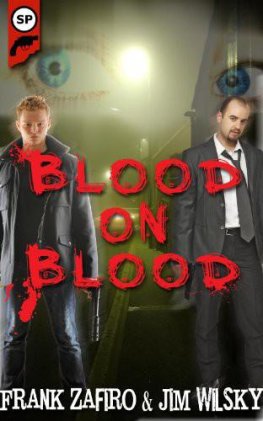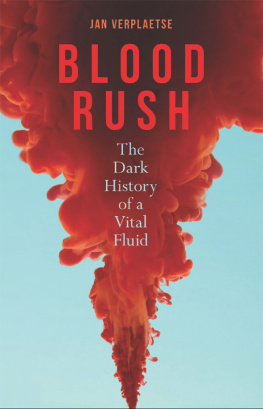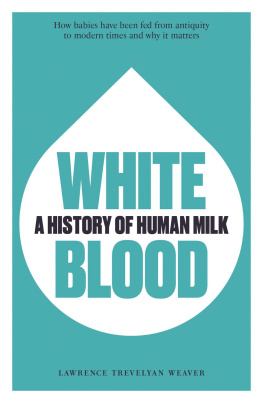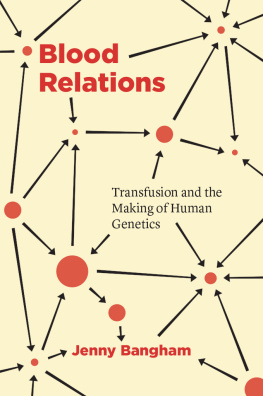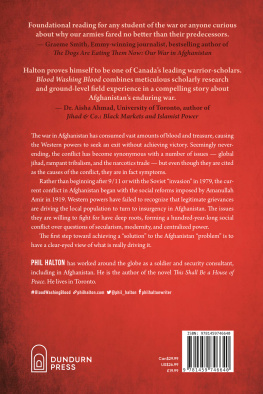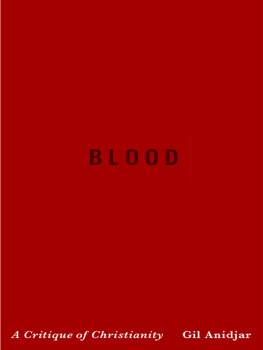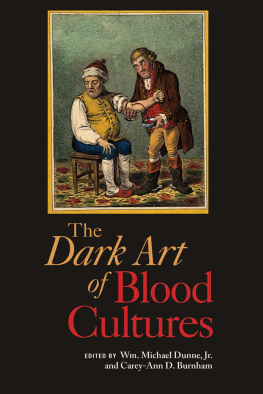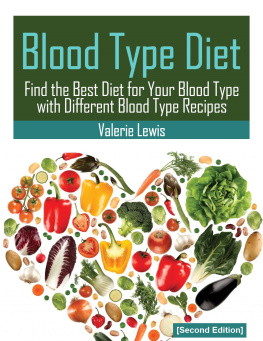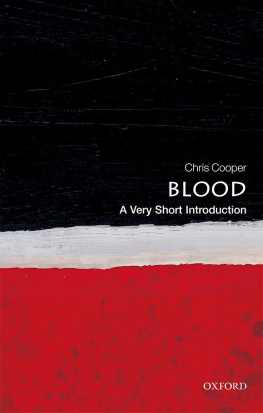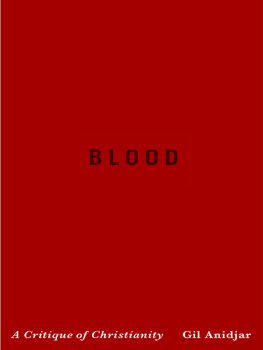BLOOD
Religion, Culture, and Public Life
Religion, Culture, and Public Life
Series Editor: Karen Barkey
The resurgence of religion calls for careful analysis and constructive criticism of new forms of intolerance, as well as new approaches to tolerance, respect, mutual understanding, and accommodation. To promote serious scholarship and informed debate, the Institute for Religion, Culture, and Public Life and Columbia University Press are sponsoring a book series devoted to the investigation of the role of religion in society and culture today. This series includes works by scholars in religious studies, political science, history, cultural anthropology, economics, social psychology, and other allied fields whose work sustains multidisciplinary and comparative as well as transnational analyses of historical and contemporary issues. The series focuses on issues related to questions of difference, identity, and practice within local, national, and international contexts. Special attention is paid to the ways in which religious traditions encourage conflict, violence, and intolerance and also support human rights, ecumenical values, and mutual understanding. By mediating alternative methodologies and different religious, social, and cultural traditions, books published in this series will open channels of communication that facilitate critical analysis.
After Pluralism: Reimagining Religious Engagement,
edited by Courtney Bender and Pamela E. Klassen
Religion and International Relations Theory, edited by Jack Snyder
Religion in America: A Political History, Denis Lacorne
Democracy, Islam, and Secularism in Turkey,
edited by Ahmet T. Kuru and Alfred Stepan
Refiguring the Spiritual: Beuys, Barney, Turrell, Goldsworthy, Mark C. Taylor
Tolerance, Democracy, and Sufis in Senegal, edited by Mamadou Diouf
Rewiring the Real: In Conversation with William Gaddis, Richard Powers, Mark Danielewski, and Don DeLillo, Mark C. Taylor
Democracy and Islam in Indonesia, edited by Mirjam Knkler and Alfred Stepan
Religion, the Secular, and the Politics of Sexual Difference,
edited by Linell E. Cady and Tracy Fessenden
BLOOD
A CRITIQUE OF CHRISTIANITY
Gil Anidjar
COLUMBIA UNIVERSITY PRESS
NEW YORK
Columbia University Press
Publishers Since 1893
New York Chichester, West Sussex
cup.columbia.edu
Copyright 2014 Columbia University Press
All rights reserved
EISBN: 978-0-231-53725-4
Library of Congress Cataloging-in-Publication Data
Anidjar, Gil.
Blood : a critique of Christianity / Gil Anidjar.
pages cm. (Religion, culture, and public life)
Includes bibliographical references and index.
ISBN 978-0-231-16720-8 (cloth : alk. paper) ISBN 978-0-231-53725-4 (e-book)
1. BloodReligious aspectsChristianity. 2. ChristianityEssence, genius, nature. 3. BloodMiscellanea. I. Title.
BR115.B57A55 2014
230dc23
2013040714
A Columbia University Press E-book.
CUP would be pleased to hear about your reading experience with this e-book at .
Jacket Design: David Drummond
References to websites (URLs) were accurate at the time of writing. Neither the author nor Columbia University Press is responsible for URLs that may have expired or changed since the manuscript was prepared.
CONTENTS
IS THERE SUCH a thing as the Christian Question?
What would it mean to ask it? What could it mean today to attend to the enormous question mark called Christianity and to ask, for instance, what Christianity is? The question is one of assignation and integration, of inner realms and outer regions, of distribution and motion, of measure, indeed, and limits.
A scholarly and, let us say, critical exploration of those concepts, the blood that runs through them, shall have to follow closely and fluently their motion and their flows. It shall adhere to blood, stick to it, heed to the presence of blood and to its absences, to its making and its fashioning, and to its differences (in philosophy and in medicine, from ancient Greece to Melville; in love and in melancholia; in poetry, history, and on TV; from economy to science; and from Jesus to Freud and beyond). For blood not only suffuses these concepts, regions, and more; it constitutes each as a clotted version of its currents.
Whether and how it has done so, whether or not the resilience and persistence of this markbloodtestifies to change, novelty, or indeed repetition: such is what is at stake here. The reading I offer, the argument I ultimately propose, is that between presence and absence, blood is the element of Christianity, its voluminous mark (citation, context). It is the way in which and upon which Christianity made its mark. More broadly, a consideration of what blood reflects, produces, and sustains, what it engenders, must takeas one adoptsthe form of a critique of Christianity.
ELEMENT, N.
Etymology: < Old French element, < Latin elementum, a word of which the etymology and primary meaning are uncertain, but which was employed as translation of Greek in the various senses < a component unit of a series; a constituent part of a complex whole (hence the four elements); a member of the planetary system; a letter of the alphabet; a fundamental principle of a science.
A component part of a complex whole.
* of material things.
1. One of the simple substances of which all material bodies are compounded.
a. In ancient and mediaeval philosophy these were believed to be: Earth, water, air, and fire.
b. In pre-scientific chemistry the supposed elements were variously enumerated, the usual number being about five or six.
c. In modern chemistry applied to those substances (of which well over one hundred are now known) which have hitherto resisted analysis, and which are provisionally supposed to be simple bodies.
2. In wider sense: One of the relatively simple substances of which a complex substance is composed; in pl. the raw material of which a thing is made.
3. The bread and wine used in the Sacrament of the Eucharist. Chiefly pl.
[The word elementa is used in late Latin in the sense of articles of food and drink, the solid and liquid portions of a meal (see Du Cange); but in the ecclesiastical use there is probably a reference to the philosophical sense of mere matter as apart from form; the form, by virtue of which the elements became Christs body and blood, being believed to be imparted by the act of consecration.]
** of non-material things.
5.
a. A constituent portion of an immaterial whole, as of a concept, character, state of things, community, etc.
b. Often followed by of = consisting of.
6. One of the facts or conditions which enter into or determine the result of a process, calculation, deliberation, or inquiry. Also with of (cf. 5b).
II. The four elements.
9. a. Used as a general name for earth, water, air, and fire; originally in sense 1, to which many of the earlier instances have explicit reference; now merely as a matter of traditional custom.

